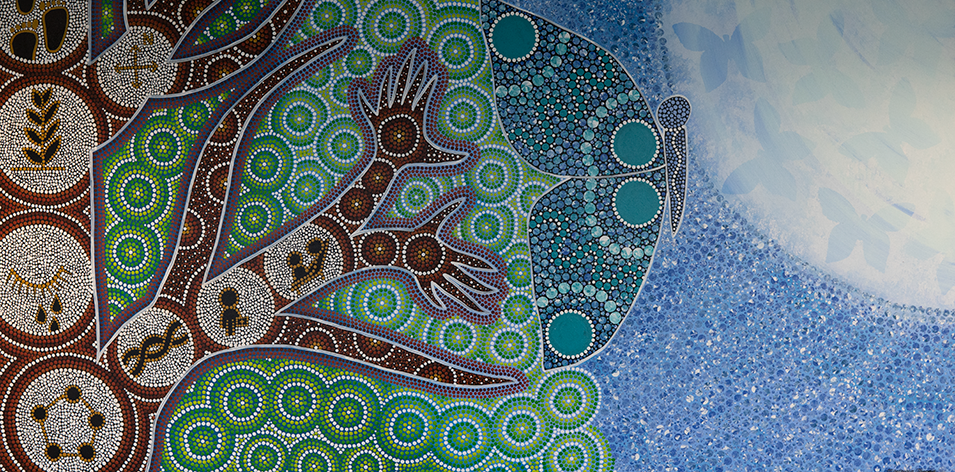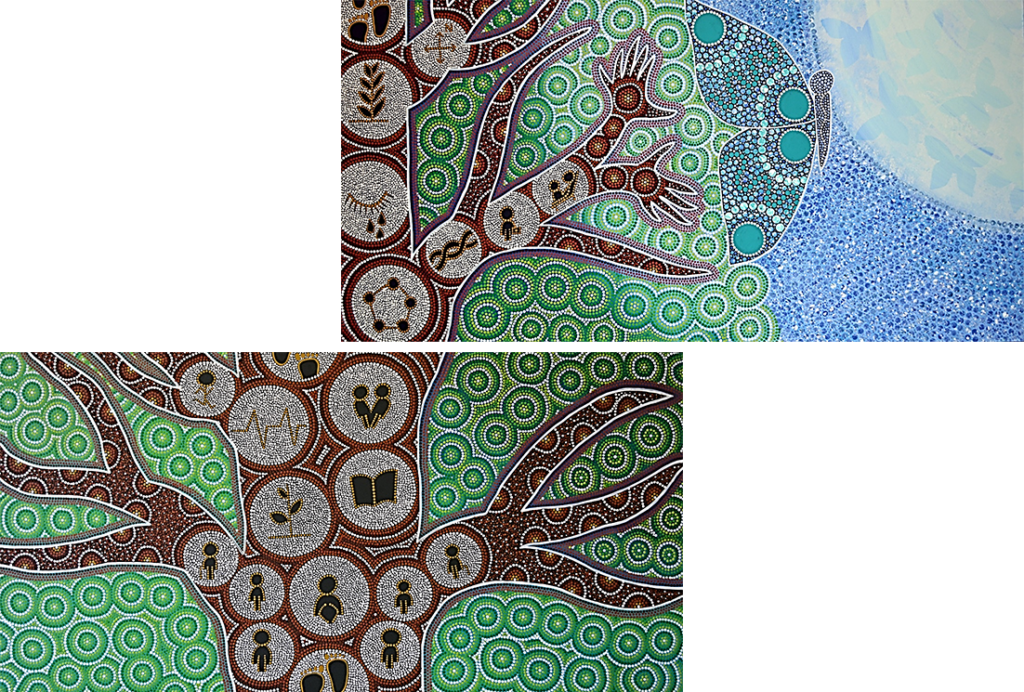Aboriginal and Torres Strait Islander Peoples Palliative Care Resources
Aboriginal and Torres Strait Islander Peoples Palliative Care Resources
Palliative Care Australia (PCA) is located in Canberra on the traditional lands of the Ngunnawal People.
PCA acknowledges the past and present traditional owners of this land and respects their continuing culture and the contribution they make to the life of this nation.
Aboriginal and Torres Strait Islander Peoples should be aware that this website contains images or names of people who have passed away.
Palliative Care Australia (PCA) aims to improve the quality of life of all Australians living with a life-limiting illness/condition and their families, and represents all who work in palliative care services.
When Aboriginal and Torres Strait Islander Peoples are diagnosed with a life-limiting illness, or are approaching the end of their life, they should be able to access quality palliative and supportive care that is consistent with their wishes, when and where they need it, no matter where they live. Importantly, this care must be culturally safe and responsive, incorporating the social, emotional, and cultural well-being of the person, as well as their family and the community.
To that end, PCA has developed resources to assist the Aboriginal and Torres Strait Islander Peoples, their communities, and health professionals working within communities to ensure approaches and practises are culturally safe and respectful.
For many Aboriginal and Torres Strait Islander Peoples talking about ‘death or dying’ can be an uncomfortable experience. Culturally, discussing this topic can be perceived as tempting it and viewing images of a person who has died or using their name in conversation can impact that person’s journey. In recognition of this, warnings are commonly added to protect Aboriginal and Torres Strait Islander Peoples from unnecessary stress.
It is not uncommon to refer to ‘death and dying’ as ‘sorry business, sad business, finishing up, final days, final footsteps/final footprints, journey, pathway or going back home or to the dreaming.’ Similarly, the term ’palliative care’ is not easily translated in the many and diverse languages spoken in Aboriginal and Torres Strait Islander communities.
More information can be found at:
- Australian Indigenous HealthInfoNet - Palliative Care and End-of-Life Care
- CareSearch - Aboriginal and Torres Strait Islander Care
Reconciliation Action Plan
In July 2021 PCA launched its second Reconciliation Action Plan (RAP). The Reflect RAP, which has been endorsed by Reconciliation Australia, lays out important steps which the organisation will be undertaking to work towards reconciliation in Australia.
This RAP is a practical tool that will enable the organisation to continue its contribution towards reconciliation in Australia. Our aim is to engage staff internally at PCA and through our Member Organisations, to develop a greater awareness and understanding of the culture and importance Aboriginal and Torres Strait Islander Peoples.
Advance Care Planning – for Aboriginal and Torres Strait Islander communities and professional workers
No one ever really knows what the future holds. From a recent survey, 88% of Australians think it is important to talk to their family about how they would want to be cared for at the end of their life. However, 50% of Australians have done nothing yet to share their end-of-life wishes.
It is never too early to start to think about what you’d want if you suddenly became very unwell and to plan ahead.
For Aboriginal and Torres Strait Islander Peoples planning ahead can be helpful to you, your family, and your community, and it is easier to do when you are well. Talking about the type of health care and healing you might want will help family members and others to understand your wishes and help decision-makers to represent you, near your end-of-life, if they ever need to.
Even though this discussion may be difficult, it can make decisions for everyone less stressful later. The evidence makes it very clear that good quality, supportive planning leads to better end-of-life care and experiences, and also supports grief and mourning for those left behind.
There are still Australians, including Aboriginal and/or Torres Strait Islander Peoples, who encounter difficulty in accessing the quality palliative care that is right for them. To address this, PCA has commissioned culturally specific resources developed by Aboriginal and Torres Strait Islander Peoples working in communities. These resources will assist Aboriginal and Torres Strait Islander Peoples, as well as professional health or community workers caring for an Aboriginal and/or Torres Strait Islander person, family or community.
Resources
Final Footprints: My Culture, My Kinship, My Country
Final Footprints consists of two informative videos with various Aboriginal and Torres Strait Islander peoples sharing what “palliative care” means to them, and their communities.
Both videos provide a wealth of cultural learnings on safe and responsive practices on how to approach the subject of ‘death and dying’. The videos explore the importance of having discussions with ‘decision makers’, your kin and community early, and having your final wishes written down. Important and uncomfortable, yet necessary topics are covered, such as:
- the importance of country, and being on country, especially near the end of one’s life or for ceremony
- the use of ‘death and dying’ language in community and why it is uncomfortable for Aboriginal and Torres Strait Islander peoples to talk about this
- family/kinship and community
- why we should encourage Aboriginal and Torres Strait Islander people to express their ‘finishing up’ wishes and talk about palliative care while they are well
- Advance Care Plans or Advance Personal Plans – what they are and how they can help
- how the traditional ways and ‘modern’ (or western medicine ways) may co-exist in today’s society.
The videos are:
- Final Footprints: My Culture, My Kinship, My Country (approximately 12 minutes). Said in their own words, four (4) interviews are held with Aboriginal and Torres Strait Islander people representing their communities outlining different perspectives on ‘palliative care’ and death and dying’. Nations represented are Torres Strait Islands, Kaurna Narungga, Yawuru, and Narungga. This video resource was developed in collaboration with Palliative Care South Australia.
- Having a Yarn – Final Footprints: My Culture, My Kinship, My Country (approximately 60 minutes). ABC presenter Dan Bourchier launches the video Final Footprints: My Culture, My Kinship, My Country (included in this video) and hosts a discussion with three highly esteemed Aboriginal people who have both ‘lived experience’ and work professionally within Aboriginal and Torres Strait Islander communities to explore the importance of palliative care to our First Nations’ peoples.
Final Footprints: My Culture, My Kinship, My Country can be accessed here.
Discussing Choices – Indigenous Advance Care Plans – A Learning Resource
This video (approximately 26 minutes) acts as a culturally safe and practical case study for professional health, Aboriginal, and community workers on ‘how to’ support and complete Advance Care Plans for end-of-life care in Indigenous communities. It also outlines the importance and benefits of an Advance Care Plan for Aboriginal and Torres Strait Islander Peoples, such as the importance of kinship, country, passing on culture to future generations and to keep families strong.
Filmed in a remote Aboriginal community on Groote Eylandt, Northern Territory, Australia, local Health Centre professionals have had success by working respectfully with the local Anindilyakwa people. This film highlights how empowering a community to express their end-of-life wishes by outlining the various aspects of an Advance Care Plan in a culturally safe and responsive way has enabled the community to see the benefits of planning for its people and for open discussion to occur. With the endorsement of Elders, many community members have completed an individual Advance Care Plan. On Groote Eylandt an Advanced Care Plan is called a ‘jura’.
Some key learnings from the video include:
- Solid partnerships with longevity
- Local needs are what drive processes
- Community initiatives and encourages conversation
- Ensuring clear communication with supporting explanation
- Clear differentiation of choices using different scenarios
- Active use of interpreters to support families
- Ensuring correct family members are informed of end-life-wishes
- Allowing for and supporting changes and flexibility
- Ensuring the right people have copies of the Advance Care Plan
Discussing Choices – Indigenous Advance Care Plans can be accessed here.
Acting as a companion video, “Finishing Up – Advance Care Plans on Groote Eylandt” offers additional learnings and can be found here. It focuses on the people’s journey on Groote Eylandt and the importance of making Advance Care Plans about their ‘final days’ with health staff, family and friends. They believe, this is as important as living life to the fullest.
Disclaimer:
It is important to know that the above are resources do not act as a legal document or an Advance Care Plan / Advance Care Personal Plan / Aged Care Directive. For additional information relating to advance care planning, please speak to your health professional, visit the Advance Care Planning Australia website or call the advance care planning advisory service on 1300 208 582, 9 am – 5 pm (AEST) Monday to Friday.
People should always consult healthcare or legal professionals for advice about their specific circumstances, including their state or territory’s legislative requirements.
Other Resources
Aboriginal and Torres Strait Islander Discussion Starter
The Discussion Starter will guide you through that discussion. It will help you prepare so that you know what you want to say and it will provide you with tips about how to start talking. You may also want to look at the Discussion Cards to help you identify what is important to you.


